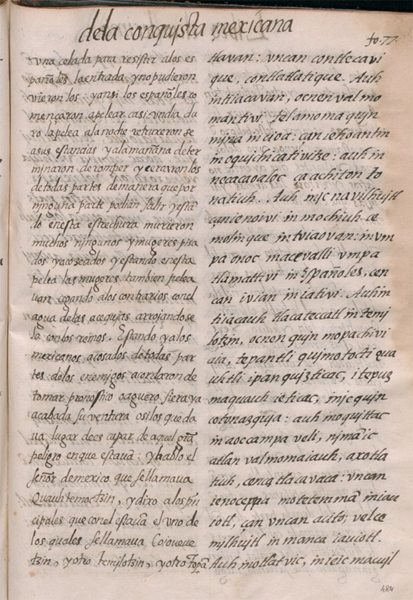Folio 77 recto
Translations and Transcriptions
Spanish Translation
[Translation of the Nahuatl into Spanish by Fr. Bernardino de Sahagún; transcription of the Spanish (left-hand column) by James Lockhart:] [f. 77r.] vna celada para resistir a los españoles la entrada y no pudieron vieronlos: y ansi los españoles començaron a pelear casi vn dia duro la pelea a la noche retruxeronse a sus estancias y a la mañana determinaron de romper y cercaronlos de todas partes de manera que por ninguna parte podian salir y estādo en esta estrechura murieron muchos ningunos* y mugeres pisados y acozeados y estando en esta pelea las mugeres tambien peleauan cegando a los contrarios con el agua de las acequias arrojandosela con los remos. Estando ya los mexicanos acosados de todas partes de los enemigos acordaron de tomar pronostico o aguero si era ya acabada su ventura o si los quedaua lugar de escapar de aquel grā peligro en que estauā, y hablo el señor de mexico que se llamaua Quauhtemoctzin, y dixo a los ṕncipales que con el estauā el vno de los quales se llamaua Coioueuetzin, y otro Temilotzin, y otro Topā ---------- *NINGUNOS. For "niños"
English Translation
[Translation of the Nahuatl (right-hand column) by James Lockhart:]
The warriors still tried to keep in formation. But [the Spaniards] did not shoot the women, only those who came standing up as men. When the fighting stopped, there was only a little sun.
And on the fourth day our enemies moved together in the same way. The Spaniards headed for where the common people were, going very slowly. And a warrior, the Tlacateccatl Temilotzin, tried to spy on them, taking shelter behind a wall. He was dressed as an eagle, and he had an iron sword with which he was going to cut them up. But when he saw that he could do nothing anywhere, he threw himself into the water, ripped into the water. There was a great clamor. Then there was fierce fighting again; it went no further
Analytic Transcription
[Transcription of the Nahuatl (right-hand column) by James Lockhart:] [f. 77r.] tlavan: vncan contlecavique, contlatlatique. Auh in tiiacavan, oc nen valmomantivi. tel amo ma quinmina in cioa: çan iehoantin in oquichicativitze:* auh in necacaoaloc ça achiton tonatiuh. Auh inic navilhuitl çan ie no ivi in mochiuh cemolinque in toiaovan: in vmpa onoc macevalli vmpa tlamattivi in Españoles, cencan ivian in iativi. Auh in tiiacauh Tlacateccatl in Temilotzin, oc nen quinmopachiviaia, tepantli quimotocti Quauhtli ipan quizticac, itepuzmaquauh ieticac, inic quincotonazquia: auh in oquittac in aoccampa veli, nim ic atlan valmomaiauh, axotlatiuh, cenca tlacavaca: vncan ie no ceppa motetemmā in iauiotl, çan vncan acito: vel cemilhuitl in manca iauiotl. Auh in otlatvic, in ie ic macuil ---------- *OQUICHIICATIVITZE. I remain unsure whether this means men or women fighting like men.
Image

Spanish Translation
[Translation of the Nahuatl into Spanish by Fr. Bernardino de Sahagún; transcription of the Spanish (left-hand column) by James Lockhart:] [f. 77r.] vna celada para resistir a los españoles la entrada y no pudieron vieronlos: y ansi los españoles començaron a pelear casi vn dia duro la pelea a la noche retruxeronse a sus estancias y a la mañana determinaron de romper y cercaronlos de todas partes de manera que por ninguna parte podian salir y estādo en esta estrechura murieron muchos ningunos* y mugeres pisados y acozeados y estando en esta pelea las mugeres tambien peleauan cegando a los contrarios con el agua de las acequias arrojandosela con los remos. Estando ya los mexicanos acosados de todas partes de los enemigos acordaron de tomar pronostico o aguero si era ya acabada su ventura o si los quedaua lugar de escapar de aquel grā peligro en que estauā, y hablo el señor de mexico que se llamaua Quauhtemoctzin, y dixo a los ṕncipales que con el estauā el vno de los quales se llamaua Coioueuetzin, y otro Temilotzin, y otro Topā ---------- *NINGUNOS. For "niños"
English Translation
[Translation of the Nahuatl (right-hand column) by James Lockhart:]
The warriors still tried to keep in formation. But [the Spaniards] did not shoot the women, only those who came standing up as men. When the fighting stopped, there was only a little sun.
And on the fourth day our enemies moved together in the same way. The Spaniards headed for where the common people were, going very slowly. And a warrior, the Tlacateccatl Temilotzin, tried to spy on them, taking shelter behind a wall. He was dressed as an eagle, and he had an iron sword with which he was going to cut them up. But when he saw that he could do nothing anywhere, he threw himself into the water, ripped into the water. There was a great clamor. Then there was fierce fighting again; it went no further
Analytic Transcription
[Transcription of the Nahuatl (right-hand column) by James Lockhart:] [f. 77r.] tlavan: vncan contlecavique, contlatlatique. Auh in tiiacavan, oc nen valmomantivi. tel amo ma quinmina in cioa: çan iehoantin in oquichicativitze:* auh in necacaoaloc ça achiton tonatiuh. Auh inic navilhuitl çan ie no ivi in mochiuh cemolinque in toiaovan: in vmpa onoc macevalli vmpa tlamattivi in Españoles, cencan ivian in iativi. Auh in tiiacauh Tlacateccatl in Temilotzin, oc nen quinmopachiviaia, tepantli quimotocti Quauhtli ipan quizticac, itepuzmaquauh ieticac, inic quincotonazquia: auh in oquittac in aoccampa veli, nim ic atlan valmomaiauh, axotlatiuh, cenca tlacavaca: vncan ie no ceppa motetemmā in iauiotl, çan vncan acito: vel cemilhuitl in manca iauiotl. Auh in otlatvic, in ie ic macuil ---------- *OQUICHIICATIVITZE. I remain unsure whether this means men or women fighting like men.
Image
